vOID Free Film Wednesdays
<<
Film in vOID January 2002 >>
Wednesday 1.16.02 • 8PM Duck
Soup (1933)

Duck Soup (1933)
The Marx Brothers' greatest and funniest masterpiece - the classic
comedy Duck Soup (1933) is a short, but brilliant satire and
lampooning of blundering dictatorial leaders, Fascism and authoritarian
government. The film, prepared during the crisis period of the Depression,
was the Marx Bros.' fifth film in a five-picture contract with Paramount
Studios (their last and best film with the studio) - it was directed
by first-class veteran director Leo McCarey and its screenplay was
written by Bert Kalmar and Harry Ruby (with additional dialogue by
Arthur Sheekman and Nat Perrin). Originally, it was to have been directed
by Ernst Lubitsch. more
info
Wednesday
1.23.02 • 8PM A Night At The Opera (1935)

A Night At The
Opera (1935)
is a musical comedy, is the sixth of thirteen Marx Brothers films,
and their first for MGM Studios under Irving Thalberg's production.
This music-oriented film, by director Sam Wood, followed the commercially
and critically unsuccessful Duck Soup (1933), the fifth and
last film they completed for Paramount. A Night at the Opera is universally
considered to be the Marx Brothers' best and most popular film, and
it received critical acclaim. By bringing their comedy sequences,
musical numbers, and plot line (a love story) up to higher standards,
the film also proved to be a tremendous financial success.
more
info
Wednesday
1.30.02 • 8PM The Public Enemy (1931)

The Public Enemy
(1931)
is one of the earliest and best of the gangster films - the second
one from Warner Bros. in the thirties. Director William Wellman's
pre-code, box-office smash was released at approximately the same
time as another classical gangster film - Little Caesar (1930)
that starred Edward G. Robinson as a petty thief whose criminal ambitions
led to his inevitable downfall. more
info
<<
Film in vOID February 2002 >>
Wednesday
2.06.02 • 8PM The Big Sleep (1946)

The Big Sleep
(1946)
is one of Raymond Chandler's best hard-boiled detective mysteries
transformed into a film noir, private detective film classic. This
successful adaptation of Chandler's 1939 novel was from his first
Philip Marlowe novel. It was directed by the legendary Howard Hawks
and scripted by Nobel laureate William Faulkner. more
info
Wednesday
2.13.02 • 8PM Little Ceasar (1930)

Little Ceasar
(1930)
One of the most well-known and best of the early classical gangster
films is Warner Bros.' Little Caesar (1930) - often called the grandfather
of the modern crime film. Although it was not the first gangster film
of the talkies era (that honor goes to Lights of New York (1928)),
it is generally considered the first great gangster film. It is a
taut and vivid film that set the genre's standards and launched the
entire popular film genre. more
info
Wednesday
2.20.02 • 8PM Notorious (1946)
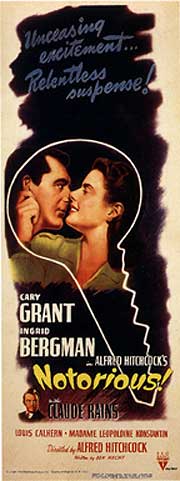
Notorious
(1946)
is a classic Hitchcockian post-war psychological suspense/thriller.
The basis of the film came from the 1921 Saturday Evening Post two-part
short story "The Song of the Dragon" by John Taintor Foote.
The master of suspense created a compelling spy mission interwoven
with a romantic love story. The dark, intricate film is thematically
concerned with both political (and sexual) betrayal and issues of
trust, friendship, and duty embodied in the characters' relationships.
more
info
Wednesday
2.27.02 • 8PM Citizen Kane (1941)


Citizen Kane
(1941)
The fresh, sophisticated, and classic masterpiece, Citizen Kane
(1941), is probably the world's most famous and highly-rated film,
with its many remarkable scenes and performances, cinematic and narrative
techniques and experimental innovations (in photography, editing,
and sound). Its director, star, and producer were all the same genius
individual - Orson Welles (in his film debut at age 25!), who collaborated
with Herman J. Mankiewicz on the script and with Gregg Toland as his
talented cinematographer. [The amount of each person's contributions
to the screenplay has been the subject of great debate over many decades.]
Toland's camera work on Karl Freund's expressionistic horror film
Mad Love (1935) exerted a profound influence on this film.
more
info
<<
Film in vOID March 2002 >>
Wednesday
3.06.02 • 8PM King Kong
(1933)

King
Kong (1933)
The greatest classic adventure-fantasy (and part-horror) film of all
time is King Kong (1933). Producers/directors Merian C. Cooper and
Ernest B. Schoedsack (both real-life adventurers) conceived of the
story of a beautiful, plucky blonde woman and a frightening, gigantic
ape-monster as a metaphoric re-telling of the archetypal Beauty and
the Beast fable. The major themes of the film include the struggle
on primitive Skull Island between the ardent and energetic filmmakers,
the voodoo natives, and the forces of nature (the Beast) for survival,
unrequited love, and the repression of violent sexual desires. However,
the Beast must also struggle against the forces of urban civilization
when it is returned for display in New York City during a time of
economic oppression. more
info
Wednesday
3.13.02 • 8PM City Lights (1931)

City Lights
(1931)
subtitled "A Comedy Romance in Pantomime," is generally
viewed as Charlie Chaplin's greatest film - a "silent film"
released three years after the start of the talkies era of sound.
The melodramatic film, a combination of pathos, slapstick and comedy,
was a tribute to the art of body language and pantomime - a lone hold-out
against the assault of the talking film. Chaplin was responsible for
the film's production, direction, editing, music, and screenplay (although
assisted by Harry Crocker, Henry Bergman, and Albert Austin). The
film includes a complete musical soundtrack and various sound effects
- but no speech or dialogue. more
info
Wednesday
3.20.02 • 8PM Fantasia (1941)

Fantasia
(1941)
a Disney animated feature-length "concert" film milestone,
is an experimental film integrating eight magnificent classical
musical compositions with enchanting, exhilarating, and imaginative,
artistically-choreographed animation. The conceptual framework of
the individual pieces embraces such areas as prehistoric times,
the four seasons, nature, hell/heaven, mythology, and legend.
more
info
Wednesday 3.27.02 • 8PM
The General (1927)

The General (1927)
is an imaginative masterpiece of dead-pan "Stone-Face"
Buster Keaton comedy, generally regarded as one of the greatest
of all silent comedies. The silent Civil War adventure epic classic
was made toward the end of the silent era. Filled with hilarious
sight gags, the chase comedy was written and directed by Buster
Keaton and Clyde Bruckman. It is memorable for its story of a single,
brave, but foolish Southern train engineer doggedly in pursuit of
his passionately-loved locomotive - his stoic, unflappable reactions
to fateful calamities, his ingenious and resourceful uses of machines
and various objects (water tanks, a large piece of timber, a cowcatcher,
a rolling artillery cannon on wheels, and unattached railroad cars),
and forces of Nature provide much of the plot. Posters describing
the film heralded: "Love, Locomotives and Laughs." more
info
<<
Film in vOID April 2002 >>
Wednesday 4.03.02 • 8PM All About
Eve (1950)
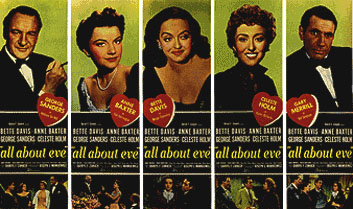
All About Eve (1950)
is a realistic, dramatic depiction of show business and backstage
life of Broadway and the New York theater. The devastating debunking
of stage and theatrical characters was based on the short story and
radio play The Wisdom of Eve by Mary Orr. A masterpiece and one of
the all-time classic films, this award winner has flawless acting,
directing, an intelligent script and believable characters. The film
is driven by Mankiewicz' witty, cynical and bitchy screenplay. Thematically,
it provides an insightful diatribe against crafty, aspiring, glib,
autonomous female thespians who seek success and ambition at any cost
without regard to scruples or feelings. more
info
Wednesday 4.10.02 • 8PM Sunset Boulevard (1950)
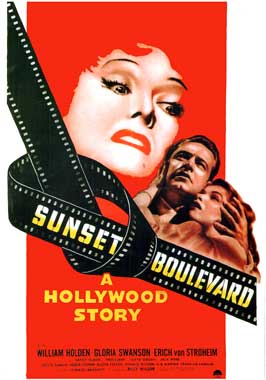
Sunset Boulevard
(1950)
is a classic black comedy/drama, and perhaps the most acclaimed, but
darkest film-noir story about "behind the scenes" Hollywood,
self-deceit, spiritual and spatial emptiness, and the price of fame.
The mood of the film is immediately established by the narrator -
a dead man floating in a swimming pool. more
info
Wednesday
4.17.02 • 8PM lt's A Gift (1934)
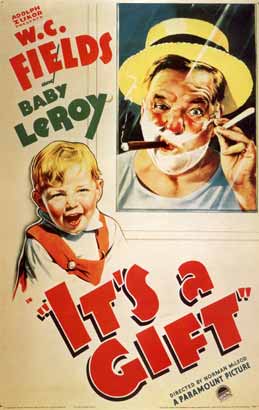
It's A Gift (1934)
is often cited as W. C. Fields' best and funniest picture - it is
undoubtedly one of the greatest, classic comedies ever made, although
it is probably less well-known than his other two masterpieces: The
Bank Dick (1940) and My Little Chickadee (1940). It was his sixteenth
(out of twenty-eight) sound film - this time directed by Norman McLeod
(director for the Marx Bros.' Monkey Business (1931) and Horse Feathers
(1932)). The screenplay by Jack Cunningham was based on a story by
Charles Bogle (Fields himself, under an alias). The core of the film
remade his silent film It's the Old Army Game (1926) - a collection
of gags from his best Ziegfeld Follies vaudeville sketches that co-starred
Louise Brooks. Like all other Fields' films, this film wasn't nominated
for an Academy Award. more
info
Wednesday
4.24.02 • 8PM Some Like It Hot
(1959)
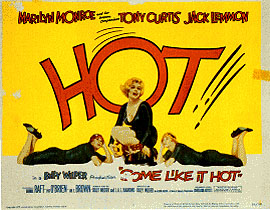
Some Like It Hot (1959)
The all-time outrageous, satirical, comedy farce favorite, Some
Like It Hot (1959) is one of the most hilarious, raucous films
ever made. The ribald film is a clever combination of many elements:
a spoof of 1920-30's gangster films with period costumes and speakeasies,
romance in a quasi-screwball comedy with one central joke - entangled
and deceptive identities, reversed sex roles and cross-dressing, and
a black and white film (reminiscent of the early film era) filled
with non-stop action (e.g., the initial car chase), slapstick, and
one-liners reminiscent of Marx Brothers and Mack Sennett comedies.
Only a few other cross-dressing comedies have come close to approximating
the film's daring hilarity: Tootsie (1982), La Cage Aux
Folles (1978) and Victor/Victoria (1982). more
info
Go to next:
|

